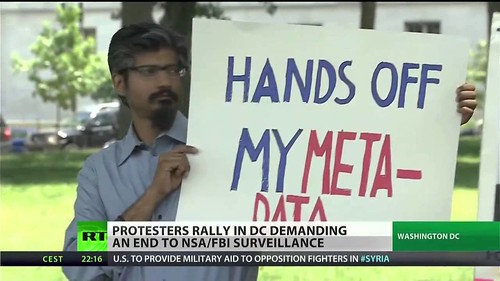
Civil liberties activists demonstrated across the United States on July 4, 2013 in opposition to broad National Security Agency spying. Edward Snowden is being scapegoated for the revelations., a photo by Pan-African News Wire File Photos on Flickr.
NSA chief denies spying on Congress
Adam Silverman, The Burlington (Vt.) Free Press 9:39 p.m. EST January 14, 2014
But Gen. Keith Alexander says the agency can make no guarantee that representatives or senators have not had their "telephone metadata" caught up in broad government sweeps.
STORY HIGHLIGHTS
Alexander sends letter in response to questions from Sen. Bernie Sanders
Sanders notes statement fails to rule out any snooping on elected officials
Government says the surveillance is necessary to protect U.S. from terrorists
BURLINGTON, Vt. -- The National Security Agency's director, responding to questions from independent Sen. Bernie Sanders of Vermont, says the government is not spying on Congress.
But a two-page letter from Army Gen. Keith Alexander to Sanders goes on to state that the agency can make no guarantee that representatives or senators have not had their "telephone metadata" caught up in broad government sweeps.
"Nothing NSA does can fairly be characterized as 'spying on members of Congress or other American elected officials,' " Alexander wrote in the letter, dated Friday and released Tuesday.
Sanders responded Tuesday evening by noting that the NSA chief failed to rule out any snooping on elected officials.
"The NSA is collecting enormous amounts of information," the senator said in a statement.
"They know about the phone calls made by every person in this country, where they're calling, who they're calling and how long they're on the phone. Let us not forget that a mere 40 years ago we had a president of the United States who completely disregarded the law in an effort to destroy his political opponents. In my view, the information collected by the NSA has the potential to give an unscrupulous administration enormous power over elected officials."
Alexander referred in his letter to the NSA's "unwavering commitment to conducting its mission in a manner consistent with the Constitution and laws," and he noted that all court decisions but one have found government's spying tactics legal.
The agency's broad snooping on the phone, email and Internet use of millions of Americans and others around the world was exposed this summer by former intelligence contractor Edward Snowden, who leaked classified material to journalists. The government says the surveillance operations are necessary to protect America from terrorists; privacy advocates and others contend the spying goes too far and runs afoul of the Constitution.
Some of the government's intelligence-gathering activities have targeted leaders of friendly foreign nations — a point Sanders highlighted when he first asked the NSA earlier this month whether the agency was spying on Congress.
"Clearly we must do everything we can to protect our country from the serious potential of another terrorist attack," Sanders said in Tuesday's statement, "but we can and must do so in a way that also protects the constitutional rights of the American people and maintains our free society."
In the Alexander letter, the NSA's leader wrote that the "telephone metadata program incorporates extraordinary controls to protect Americans' privacy interests," and one of those protections prevents the agency from searching the information except under specific circumstances.
"The NSA can query the metadata only based on phone numbers reasonably suspected to be associated with specific foreign terrorist groups," Alexander wrote.
"For that reason, NSA cannot lawfully search to determine if any records NSA has received under the program have included metadata of the phone calls of any member of Congress, other American elected officials, or any other American without that predicate."
Alexander closed by offering to meet and discuss the issue further with Sanders — who has introduced legislation that would prevent the "wholesale collection" of phone records without the government's obtaining a warrant.
No comments:
Post a Comment